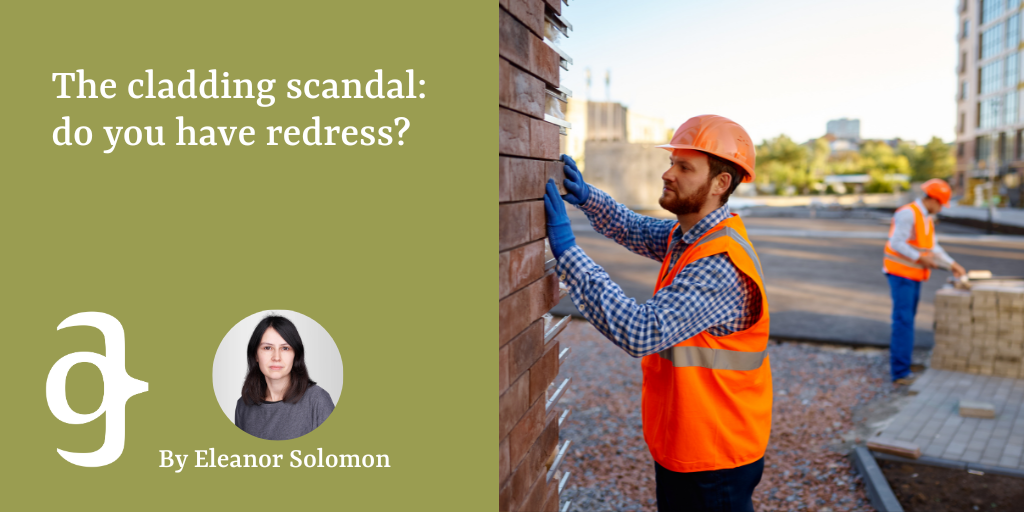The cladding scandal: do you have redress?

Following fire safety regulations which were a response to Grenfell, many thousands of leaseholders are trapped in unsafe flats, unable to remortgage or sell. They have suffered a substantial loss. But are they able to sue? There are various legal routes, and it is not always straightforward to work out which apply. I talk through the most common ones below. This article focuses on fire safety, but the law below applies to all sorts of building defects including structural issues, heating and hot water problems with communal systems and a host of other issues. It is often the case that there is more than one kind of defect and that claims for all the defects can be brought together.
S1 Defective Premises Act 1972
Limitation
The Building Safety Act 2022 amended the limitation deadlines for Defective Premises Act claims so that if the building in question was completed (or major works were done to it) before 1 April 2023, then a claim must be brought within 30 years of the building being completed.
This means that a lot more people have a claim under the Defective Premises Act than they did prior to the Building Safety Act. But not everyone does. The Defective Premises Act relates to buildings being built badly in the first place, or a ‘conversion or enlargement’ being done badly. So if defective cladding or other fire-safety concerns, such as a lack of fire stopping, were there from the start then you may have a claim under this act. Likewise, if a building was converted (poorly) from a commercial to residential building, or an extension or another level was built then there may be a claim. If flammable cladding was added later, and the initial build was not defective, then there will not be a claim under this act. This is a problem for many leaseholders.
Who can you sue?
Claims under this Act are against the developer or the body who commissioned the build. Housing associations often commission new buildings. The identity of the Defendant or Defendants needs to be looked at very carefully. It is not unusual for a developer to set up a limited company as a vehicle for a particular build, then liquidate it and transfer the assets when the build is complete. Likewise housing associations may have associated limited companies which are vehicles for specific projects. The Building Safety Act does provide a route to go beyond these temporary companies and sue the parent company, but it is untested.
Who can sue?
Anyone who has acquired an interest in the defective property can sue. This means that it doesn’t have to be the first person to buy the flat who sues, subsequent owners also can, as can tenants.
What must you prove?
In order to have a claim under this act you must prove that the developer or body who commissioned the build did not comply with their duty to “to see that the work which he takes on is done in a workmanlike or, as the case may be, professional manner, with proper materials and so that as regards that work the dwelling will be fit for habitation when completed”.
Whether this applies must be assessed on a case-by-case basis and supported by evidence from expert surveyors.
The Lease
Long residential leases usually have clauses saying that the freeholder has to repair certain parts of the building. Putting right defective cladding or fire risk issues is not a repair. But sometimes there are additional clauses requiring the freeholder to improve the building in certain circumstances. These clauses need to be looked at carefully as they may give leaseholders a route to sue the freeholder.
Contract for sale
If you bought the flat off plan then there may be contractual promises in the contract for sale to build to a certain standard. Such claims must be brought within 6 years of you purchasing the flat.
Nuisance and breach of quiet enjoyment
If, as a byproduct of having cladding removed, you have had scaffolding up for years, had to be evacuated, had noisy or intrusive works and/or damp and mould due to a lack of insulation, then you may have a claim against the freeholder for nuisance and/or breach of quiet enjoyment. This kind of claim will not enable you to compel the freeholder to resolve the cladding or fire safety issues. It will enable you to claim compensation, and perhaps an injunction to force the freeholder to undertake temporary measures to improve your immediate living situation.
Tenants and leaseholders may have claims here.
Fitness for Human Habitation
Only tenants will have claims under this act, not long leaseholders. But claims brought by tenants in the block could end up benefiting everyone if works are done as a result of the tenant claims. If flats are not fire safe then they are unlikely to be fit for human habitation and there will therefore be a claim for remediation and damages.
Regulatory routes
The local authority or fire service may issue notices requiring the freeholder to make improvements to the property.
Conclusion
There are a lot of different legal routes to redress for defective cladding, poor fire safety and other building defects. Some people may have more than one form of redress, if so it is possible to sue using multiple causes of action in one claim. At court a judge may be able to order that you receive compensation, that works be undertaken and that you receive your legal costs. However out of court settlements are common. If the court case is likely to be lengthy and expensive for the developer or freeholder, and the value of the works is high, the developer or freeholder may agree to buy back your property at market value, as if there were no defects.
If everyone in a block or estate suffers from the same or similar defects then they can come together to bring a claim as a group.
Anthony Gold offers ‘no-win, no-fee’ agreements for some cases related to defective buildings. If you own a defectively built property and would like to explore whether you have a claim then please call 020 7940 4060 and ask to speak to the housing department, or email a summary of your situation to hne@anthonygold.co.uk
* Disclaimer: The information on the Anthony Gold website is for general information only and reflects the position at the date of publication. It does not constitute legal advice and should not be treated as such. It is provided without any representations or warranties, express or implied.*
No comments